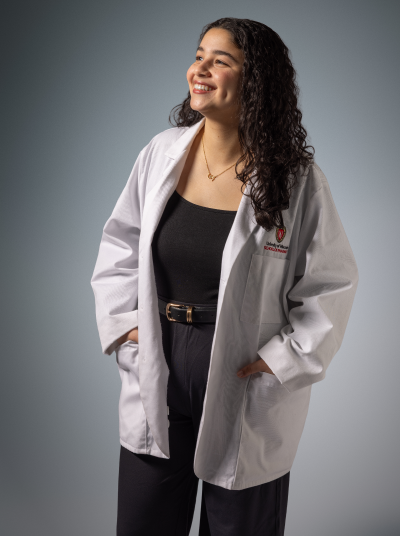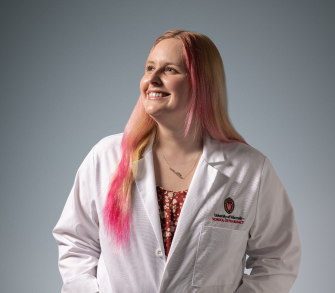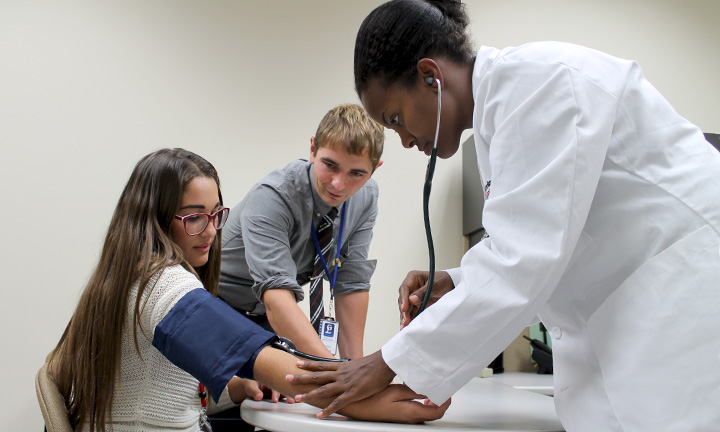What IPPEs and APPEs Really Mean (And the Experiences I’ll Remember Forever)
By Reem Salah , PharmD Class of 2026

Let’s start with UW–Madison’s take on clinical training.
What are IPPEs like?
IPPE stands for Introductory Pharmacy Practice Experience. They are essentially mini clinical rotations that let you experience what it’s like to be at different pharmacy settings. These occur throughout your first three years of pharmacy school. They range in length from 16 hours to 80 hours, divided over various numbers of days. For example, I had an 80-hour IPPE that was two weeks straight during the summer, and another that was one day a week over 10 weeks during the semester. The 10-week one had time built into our semester schedule for it (i.e., no classes that day each week).
During my first three years of pharmacy school, I had IPPEs at community pharmacies, hospitals, and clinics. When you’re a first year, your IPPE is mostly observing (by Wisconsin law). In your second year, you start being able to do more pharmacist-type things. So sometimes IPPEs feel like shadowing, and sometimes they feel like interning.
Which IPPEs stood out to me?
All of my IPPEs have stood out to me in different ways! Here are just some highlights:
Discovering new pharmacy settings
My first-ever IPPE was at Froedtert’s Outpatient Cancer Center with Dr. Seubert. I had been working at a community pharmacy before this, but I didn’t realize that hospitals had specialized community pharmacies! Overall, this IPPE introduced me to a unique side of community pharmacy, and it showed me how varied pharmacy is.
Dr. Seubert was an excellent preceptor (supervising pharmacist). He was passionate, energetic, and you could tell he really enjoyed teaching. I got to learn about cancer medications and interact with a patient population that was new to me. That was also my first time seeing a hospital pneumatic tube system, which I thought was super cool; it reminded me of the scream cans from Monsters Inc that would zip around.
Needing pharmacists in a 24/7 world
During the summer before my second year, I had a 16-hour Overnight IPPE at Ascension with Dr. Peterson. Now, to be fully transparent, when I signed up for it, I totally missed the overnight part because I didn’t know what “third shift” was. So when I realized it was overnight, I was like ‘Oh, this will be interesting!’ And it was! It ended up being one of the most valuable learning experiences I’ve had.
Dr. Peterson was kind enough to let me break it up over four days, which helped me get adjusted to the overnight timing. She was super awesome and gave me hands-on experience with compounding! For those who don’t know, compounding is when pharmacists prepare customized medications from scratch. Examples are mixing IV solutions or making medications that aren’t available pre-made. It requires precision, care, and sterile technique.
She showed me how to gown up, scrub in, and use proper technique in the sterile compound hood. Each day, she would teach me a new compounding skill, like how to draw up medication into a syringe, reconstitute vials, or prepare IV bags. Just to be clear, none of this was with real products going to patients. It was all for practice, which made it a safe space to learn.
Because of this experience, I felt way more confident going into my second-year compounding labs. Instead of walking in blind, I already had some practice under my belt, and that made a big difference for me. This IPPE showed me how pharmacists work behind the scenes during all hours of the day (and night!) to keep patients safe. It was an unexpected but unforgettable part of my pharmacy school journey.
Exploring patient care in hospitals
During the summer before my third year, I had an inpatient hospital pharmacy rotation at SSM Health with Dr. Arends. What stood out to me in this rotation was, as a rising third-year, you realize that you have so much clinical knowledge, and you get to put it to use. My preceptor integrated me into the workflow, letting me work up patients before attending rounds with him, even dosing medications like warfarin (blood thinner) for admitted hospital patients (with him supervising, of course) and writing the notes on my own, too! Having my name on notes in the patient charts felt exciting to me.
Those are just some of my more memorable IPPE experiences, and I am so happy to say that I’ve had awesome pharmacist preceptors at every clinical rotation I’ve done!
Learning something new at every IPPE
Now, you’re not always going to get your first, second, or even third choice when it comes to IPPE placements. The reality is, each site has limited spots, and if there’s a site you’re excited about, chances are a lot of your classmates are, too. Not all of these IPPEs were what I had as my first choice, but they all ended up being great learning experiences! What I can say is, there’s something valuable to learn from every IPPE. A lot of times, those unexpected placements are the ones that surprise you the most, in a good way. Oftentimes so good they have you reconsidering what kind of pharmacist you want to be!
What are APPEs?
APPE stands for Advanced Pharmacy Practice Experience. These are 6-week rotation blocks that make up your entire fourth and final year of pharmacy school (8 blocks total). Each block is intended to integrate you into different pharmacy settings, including community, hospital, administration, ambulatory care (clinic), and more.
What’s nice about APPEs is that you’re done with all the classes and exams, and now you get to put what you learned into practice. They are great real-world learning experiences that help you develop a network, build confidence, strengthen your clinical decision-making, and see what areas of pharmacy you’re most passionate about.
The truth about APPEs
To be honest, APPEs can be challenging. They’re full-time, unpaid clinical rotations, and that’s the case at every pharmacy school. Some days can be long and tiring, and it can be tough to manage financially. Knowing this ahead of time makes a big difference. Being mentally and financially prepared going in helps you focus on learning and growing.
Don’t be discouraged if you have a rotation and realize you don’t enjoy that area of pharmacy. It’s just as important to figure out what you don’t like as it is to find what you do like. Every experience helps shape your future career.
Going global
Something unique about the UW-Madison School of Pharmacy is that we have worldwide partnerships, meaning we can do international APPE rotations! I am super excited for my international rotation at La Paz Hospital in Madrid, Spain. I also have classmates going to South Africa, Belize, and Thailand.
Confident in my choice of UW-Madison
Choosing a pharmacy school is a big decision, and for me, UW–Madison has lived up to its reputation. The Pharmacy Badger network is strong and sticks together. In instances where I’ve met Badger Pharmacists outside of Madison, it becomes an instant connection!
One of the most surprising things for me was how much knowledge I gained. All those hours in the lab and studying for exams come together. That doesn’t mean every day is a breeze; there’s a lot of room to grow, which is how it should be. But it’s so much easier to grow coming from a school whose curriculum prepared you to be challenged and know resources to turn to for those moments when you don’t know the answer.
I saw it in the classes above me, and although it took me a while to see it in myself, I genuinely believe that UW-Madison takes great students and makes them into great pharmacists.

What I actually did in my introductory clinical rotations (and why it matters)

The UW–Madison School of Pharmacy doesn’t push you in one direction. It gives you the foundation, freedom, and mentorship to explore your direction—whatever that may be.

Our clinical training program is designed to prepare you for your first job and a thriving, long-term future in pharmacy.